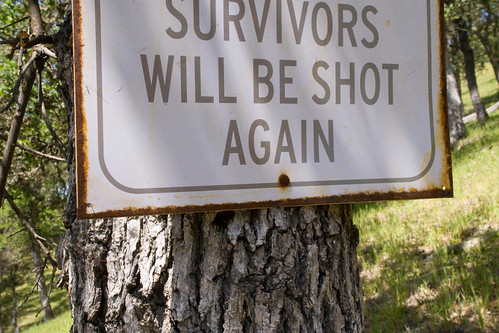It’s your first time traveling outside your home country’s borders and you’re scared. Naturally … there are many dangerous places out there. Maybe you simply fear potential misunderstandings; something as subtle as showing someone the underside of your foot is enough to offend locals in many countries.
But the major factor is the unknown, what drives us to leave home in the first place. You don’t know how people live their lives in another culture. You can’t understand why some just don’t like Americans. You’re blissfully ignorant of local laws, laws you believe apply only to the citizens of a nation you just happen to be visiting …
Ignorance of a relatively important local law could cost you your life.
Let’s look back at Ancient Egypt. True, many laws around this time centered around heresy and arcane customs, but even those residents of “civilized” parts of the world (i.e. the Roman Empire) might have been caught off guard during visits to Cairo. Cats, as you may know, were sacred to the Egyptians, their likeness used to represent goddesses like Bast and Sekhmet. More to the point, the punishment for the killing of a cat, even unintentionally, was death. In this case, ignorance of a relatively important local law could have cost you your life.
Others today can still cost your freedom, your livelihood and quite possibly your life. Here are seven activities abroad that may do just that:

No prison bars as strong as my will © assbach
#1: TRANSPORTING DRUGS, SOUTHEAST ASIA
A British man was recently executed in China after being suspected of smuggling heroin. The facts of this case are unclear despite the crystal-clear sentence by Chinese authorities. However, there are two things in this world you can be certain of: don’t carry illegal substances across borders and the stupidest thing is to do so in Asia.
Granted, many western countries have severe consequences for such crimes, but nowhere on earth is the punishment as swift and brutal as we see in Southeast Asia and the Middle East.
Just ask Samantha Orobator, a British woman arrested and sentenced to death by firing squad in Laos last May. She was given a life sentence after authorities discovered she had been pregnant; whether this was a tactic to escape execution, violation, or something else is unknown.
In Singapore, anyone in possession of as little as 3 grams of morphine or 15 grams of cannabis receives an automatic death sentence … by hanging.
#2: TRESPASSING, TEXAS

Will Be Shot Again © Orin Zebest
Let’s say you make a career of peeping or breaking and entering … just humor me. So you thought one of any number of US states would be ideal for such an intrusion. Guess again: half of all states have what’s called castle laws in effect, which allow landowners to injure, shoot, even kill those violating their property without any legal restraints.
That’s right: you can shoot trespassers point-blank and not be sued or criminally tried. Jehovah’s Witnesses and Girl Scouts beware.
#3: INSULTING THE KING, THAILAND
The Lese Majeste Law in Thailand, although never having resulted in the death penalty, I mention for its seemingly innocuous nature (and, some would argue, Thai prisons are worse than death). Royalty is given respect above and beyond anything westerners can understand, even citizens of countries with monarchies still in place. When the royal anthem is played on loudspeakers across the city at certain hours every day, people are expected to drop their work and turn to the nearest flag.
Dropping a coin, which bears the king’s image, is almost sacrilege; intentionally step on a Baht note, and you could find yourself in prison rather quickly. Unlike David McMillan, you won’t have the means to mount an escape.
#4: KILLING A COW, INDIA AND NEPAL

Resting Cows © betta design
This is actually not as black and white as it seems. Some people do in fact eat beef in India and Nepal and do not find themselves in handcuffs within the hour. In India, slaughtering a cow for food or even accidentally hitting it with a car can result in a steep sentence … anywhere from one year to life behind bars and death.
In the Himalayan kingdom, there are very few “pure” Hindi who look upon bovines as sacred, and so some are punished only by officials looking to exact revenge, abusing their power. Either way, be careful when you drive, and resist the temptation for a fresh hamburger.
#5: NOT CARRYING ID, JAPAN

Quadrilingual sign: Alien Registration #8215 © Nemo’s great uncle
Some of you probably think I’m joking: a civilized country like Japan would lock me up just for failing to present ID? Yes, they would. In the land of the rising sun, all foreign residents are required to carry their “gaijin card” (外国人登録証) or passport AT ALL TIMES. No exceptions. If you happen to walk past a policeman who feels it’s his sacred duty to protect his country from “dangerous foreigners”, he will most likely inspect your ID.
Fail to present this, and you could find yourself behind bars for 23 days with absolutely no contact from the outside world: 3 days’ initial interrogation, which can be extended twice by 10 days upon a judge’s approval. This is true of anyone suspected of a crime, not just foreigners who may have rushed out the door and forgotten a vital form of government-issued paper. Even when I went for long runs, my gaijin card was tucked safely inside my pocket.
#6: EATING IN PUBLIC, UNITED ARAB EMIRATES
There are all kinds of activities prohibited under Islamic law. Several British citizens have been arrested in Dubai for engaging in drunken premarital sex and given months in prison. This can be avoided easily enough if you’re not traveling with a date or looking for a local hook up, but what about eating?
Just be careful during the holy month of Ramadan, when you can be fined or jailed for eating in public during daylight hours (depending on the country), essentially mocking the prayers of those around you. Even when you’re visiting an Islamic nation that might have open restaurants for visitors, be respectful.
#7: CALLING THE POLICE, KOREA
I’m hesitant to include this particular story, but I have heard similar accounts across Asia and Africa. I suppose it begins with a certain fear of the police force of any country, those with the power to throw you behind bars at their discretion, even if you can’t understand what you’re being charged with or how long you’ll be behind bars.
Take the Metropolitician, a foreign resident of Korea who found himself being harassed by a drunk racist local while working on a photoshoot outside of Seoul. He ignored him. He walked away. He escaped to a restaurant. Once the man followed him in there and just wouldn’t let up with his hate speech, he finally called the police … and found himself arrested.
The reason? The drunk, racist, says he kicked him. Of course his word, as a Korean, is more trustworthy, and the “dangerous foreigner” should be arrested, which he was.
The police’s advice? “You should have just gone home. You shouldn’t have called us. Next time, just leave.”
And that is the moral of this particular story. When you’re the foreigner, and you haven’t done anything wrong, RUN. Otherwise, all the person has to do is lie, and you’re guilty until proven innocent. Even if they’re a drunk, nearly homeless loser without even a single witness to corroborate his lies.
What seeminginly innocuous acts have gotten you into trouble abroad? Share your travel stories in the comments below!
But the major factor is the unknown, what drives us to leave home in the first place. You don’t know how people live their lives in another culture. You can’t understand why some just don’t like Americans. You’re blissfully ignorant of local laws, laws you believe apply only to the citizens of a nation you just happen to be visiting …
Ignorance of a relatively important local law could cost you your life.
Let’s look back at Ancient Egypt. True, many laws around this time centered around heresy and arcane customs, but even those residents of “civilized” parts of the world (i.e. the Roman Empire) might have been caught off guard during visits to Cairo. Cats, as you may know, were sacred to the Egyptians, their likeness used to represent goddesses like Bast and Sekhmet. More to the point, the punishment for the killing of a cat, even unintentionally, was death. In this case, ignorance of a relatively important local law could have cost you your life.
Others today can still cost your freedom, your livelihood and quite possibly your life. Here are seven activities abroad that may do just that:

No prison bars as strong as my will © assbach
#1: TRANSPORTING DRUGS, SOUTHEAST ASIA
A British man was recently executed in China after being suspected of smuggling heroin. The facts of this case are unclear despite the crystal-clear sentence by Chinese authorities. However, there are two things in this world you can be certain of: don’t carry illegal substances across borders and the stupidest thing is to do so in Asia.
Granted, many western countries have severe consequences for such crimes, but nowhere on earth is the punishment as swift and brutal as we see in Southeast Asia and the Middle East.
Just ask Samantha Orobator, a British woman arrested and sentenced to death by firing squad in Laos last May. She was given a life sentence after authorities discovered she had been pregnant; whether this was a tactic to escape execution, violation, or something else is unknown.
In Singapore, anyone in possession of as little as 3 grams of morphine or 15 grams of cannabis receives an automatic death sentence … by hanging.
#2: TRESPASSING, TEXAS

Will Be Shot Again © Orin Zebest
Let’s say you make a career of peeping or breaking and entering … just humor me. So you thought one of any number of US states would be ideal for such an intrusion. Guess again: half of all states have what’s called castle laws in effect, which allow landowners to injure, shoot, even kill those violating their property without any legal restraints.
That’s right: you can shoot trespassers point-blank and not be sued or criminally tried. Jehovah’s Witnesses and Girl Scouts beware.
#3: INSULTING THE KING, THAILAND
Quote
“Whoever defames, insults or threatens the King, the Queen, the Heir-apparent or the Regent, shall be punished with imprisonment of three to fifteen years.”
The Lese Majeste Law in Thailand, although never having resulted in the death penalty, I mention for its seemingly innocuous nature (and, some would argue, Thai prisons are worse than death). Royalty is given respect above and beyond anything westerners can understand, even citizens of countries with monarchies still in place. When the royal anthem is played on loudspeakers across the city at certain hours every day, people are expected to drop their work and turn to the nearest flag.
Dropping a coin, which bears the king’s image, is almost sacrilege; intentionally step on a Baht note, and you could find yourself in prison rather quickly. Unlike David McMillan, you won’t have the means to mount an escape.
#4: KILLING A COW, INDIA AND NEPAL

Resting Cows © betta design
This is actually not as black and white as it seems. Some people do in fact eat beef in India and Nepal and do not find themselves in handcuffs within the hour. In India, slaughtering a cow for food or even accidentally hitting it with a car can result in a steep sentence … anywhere from one year to life behind bars and death.
In the Himalayan kingdom, there are very few “pure” Hindi who look upon bovines as sacred, and so some are punished only by officials looking to exact revenge, abusing their power. Either way, be careful when you drive, and resist the temptation for a fresh hamburger.
#5: NOT CARRYING ID, JAPAN

Quadrilingual sign: Alien Registration #8215 © Nemo’s great uncle
Some of you probably think I’m joking: a civilized country like Japan would lock me up just for failing to present ID? Yes, they would. In the land of the rising sun, all foreign residents are required to carry their “gaijin card” (外国人登録証) or passport AT ALL TIMES. No exceptions. If you happen to walk past a policeman who feels it’s his sacred duty to protect his country from “dangerous foreigners”, he will most likely inspect your ID.
Fail to present this, and you could find yourself behind bars for 23 days with absolutely no contact from the outside world: 3 days’ initial interrogation, which can be extended twice by 10 days upon a judge’s approval. This is true of anyone suspected of a crime, not just foreigners who may have rushed out the door and forgotten a vital form of government-issued paper. Even when I went for long runs, my gaijin card was tucked safely inside my pocket.
#6: EATING IN PUBLIC, UNITED ARAB EMIRATES
There are all kinds of activities prohibited under Islamic law. Several British citizens have been arrested in Dubai for engaging in drunken premarital sex and given months in prison. This can be avoided easily enough if you’re not traveling with a date or looking for a local hook up, but what about eating?
Just be careful during the holy month of Ramadan, when you can be fined or jailed for eating in public during daylight hours (depending on the country), essentially mocking the prayers of those around you. Even when you’re visiting an Islamic nation that might have open restaurants for visitors, be respectful.
#7: CALLING THE POLICE, KOREA
I’m hesitant to include this particular story, but I have heard similar accounts across Asia and Africa. I suppose it begins with a certain fear of the police force of any country, those with the power to throw you behind bars at their discretion, even if you can’t understand what you’re being charged with or how long you’ll be behind bars.
Take the Metropolitician, a foreign resident of Korea who found himself being harassed by a drunk racist local while working on a photoshoot outside of Seoul. He ignored him. He walked away. He escaped to a restaurant. Once the man followed him in there and just wouldn’t let up with his hate speech, he finally called the police … and found himself arrested.
The reason? The drunk, racist, says he kicked him. Of course his word, as a Korean, is more trustworthy, and the “dangerous foreigner” should be arrested, which he was.
The police’s advice? “You should have just gone home. You shouldn’t have called us. Next time, just leave.”
And that is the moral of this particular story. When you’re the foreigner, and you haven’t done anything wrong, RUN. Otherwise, all the person has to do is lie, and you’re guilty until proven innocent. Even if they’re a drunk, nearly homeless loser without even a single witness to corroborate his lies.
What seeminginly innocuous acts have gotten you into trouble abroad? Share your travel stories in the comments below!



0 comments:
Post a Comment